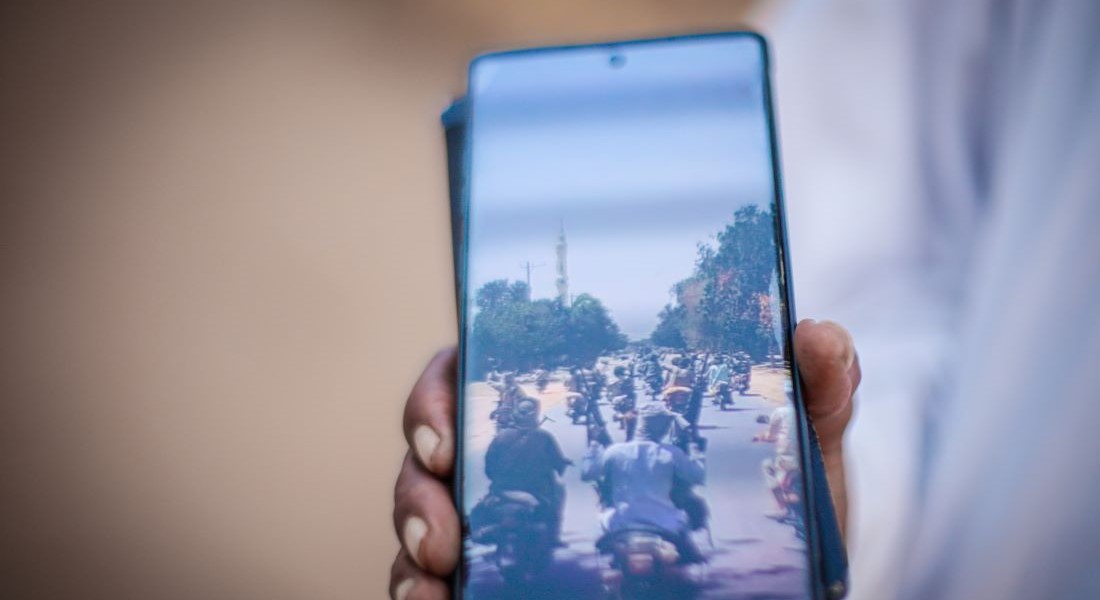Workshop: Remediating Genocide: The Case of ARDAMATA
An innovative workshop that critically explores the intersection of art, forensic journalism, and filmmaking in Sudan.

The project, Remediating Genocide: The Case of ARDAMATA, seeks to creatively transform visual documentation of mass violence into artworks that challenge perceptions of truth and credibility in war contexts.
The project addresses the atrocities of the Ardamata massacre in Darfur by transforming unseen digital archives and community-sourced material, including videos from perpetrators, survivors, and new footage collected by journalist Sara Creta, into reflective multimedia artworks.
The project culminates in two key phases: the development of artworks and a public exhibition. Participants will receive ongoing mentorship and budgets to refine their artistic projects, drawing on the insights gained during the workshop. The final artworks will then be showcased in a public exhibition and a publication, sparking conversations on the role of art in confronting social issues such as violence, memory, and accountability.
Workshop details
- Dates: February 2025
- Location: Nairobi, Kenya
- Format: a fully funded week-long intense workshop will include collaborative sessions, one-on-one mentorship, and critical discussions, encouraging participants to push the boundaries of visual storytelling and engage deeply with the materials provided.
We are delighted to unveil the participants selected for the groundbreaking workshop Remediating Genocidal Images into Artworks: The Case of ARDAMATA in Darfur. This initiative merges forensic journalism and filmmaking into a dynamic, co-creative process, bringing together the talents of Sudanese storytellers and artists. The participants were chosen for their compelling artistic visions and their dedication to collaborative exploration of new documentary forms.
“This talented group of artists spans a wide range of crafts, modes of creative storytelling, and approaches to artistic exploration”, said Nina Grønlykke Mollerup, Associate Professor at Copenhagen University. “Each of them comes with a deep commitment to creating crucial spaces of dialogue through art. We are extremely excited to join them for an open-ended, collaborative workshop about truth, justice, reconciliation, and healing that will allow us to merge academia and artistic exploration.”
The workshop represents a unique collaboration between Sudanese artist Khalid Albaih and the Views of Violence research project at the University of Copenhagen, supported by funding from the Independent Research Fund Denmark. Together, we aim to spark vital conversations on the role of art in addressing critical social issues, including violence, memory, and accountability.
We are also pleased to acknowledge the generous financial support of the Danish Institute in Damascus, which has helped make this workshop possible.
Through this initiative, we hope to inspire dialogue, foster creativity, and challenge traditional narratives by exploring the transformative power of art in confronting the aftermath of violence.
The selected artists are:
Hozaifa Elsiddig is practicing painting and he developed a unique technique of utilizing the characteristics of oil and acrylic on paper to create rich textures. Alongside his artistic practice, his background in architecture - studying at the University of Khartoum - has influenced his approach to art. Deeply affected by the 2019 Sudanese revolution and the visual aspects of that period, Huzaifa developed a particular interest in exploring the experiences of oppressed individuals, shedding light on their coping mechanisms and the systemic nature of their oppression. His work seeks to expose these issues while focusing on personal narratives rather than collective experiences.
Khalid ElKhateem is a Sudanese-Norwegian visual artist originally from the Nuba Mountains in Sudan and currently based in Oslo, Norway. His multidisciplinary practice spans photography, visual art, installation, drawing, painting, and sculpture. Khalid draws inspiration from modernist painting, the art of ancient civilizations, and the rich cultural heritage of Sudan. A significant part of his work celebrates his Nuba heritage and explores the cultural legacy eroded by Islamic conquest and European colonialism.
Ibrahem Ahmed Taha is a Sudanese musician whose career spans over 11 years in the music industry as a songwriter, multi-instrumentalist, and sound engineer. He co-founded Aswatalmadina Production and Band, where he serves as the vocalist and music director. Ibrahem blends traditional Sudanese melodies with contemporary sounds, creating emotionally resonant and innovative compositions that connect with audiences globally.
Mohamed Ali Abdelaziz Bakr is a photographer, filmmaker, and storyteller who uses his craft to raise awareness of systemic injustices and the psychological impacts of war in Darfur. As an advocate with the Darfur Network for Human Rights, his work highlights pressing human rights issues.
Roaa Ismail is a digital media practitioner, researcher, and storyteller whose work explores the intersections of culture, art, conflict, and governance. Based in Kigali, she studied genocide memorials and their artistic approaches to confronting difficult histories. As a co-founder of Dar Janoub, an interdisciplinary media platform, Roaa is dedicated to shifting narratives from Sudan and the Global South by curating underrepresented stories and fostering collaborations across artistic disciplines.
Sannad Mohamed Shreef is a visual artist specializing in painting and sculpture. He crafts fabric-based dolls and allows his creative process to be guided by the brush and the vibrant interplay of colors, resulting in unique and evocative works of art.
See programme (pdf)
About the project partners
The project is a collaboration between Sudanese artist Khalid Albaih and the Views of Violence research project at the University of Copenhagen, funded by the Independent Research Fund Denmark. It aims to foster dialogue on the role of art in confronting social issues such as violence, memory, and accountability. The Danish Institute in Damascus also financially supports the workshop.
Additional information
While the project has partial funding from the Views of Violence initiative, we are seeking additional support to fully realise this initiative's potential. The selected participants will have their travel and accommodation covered for the workshop, and a modest stipend will be provided to support the development of the final artwork.
